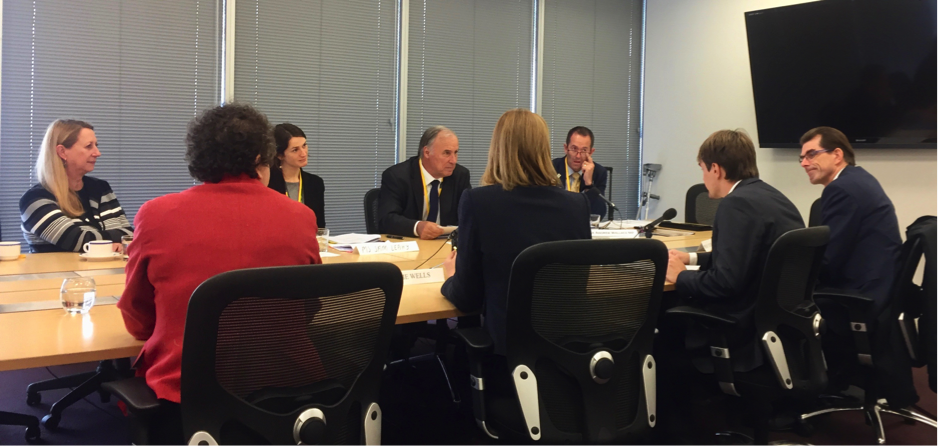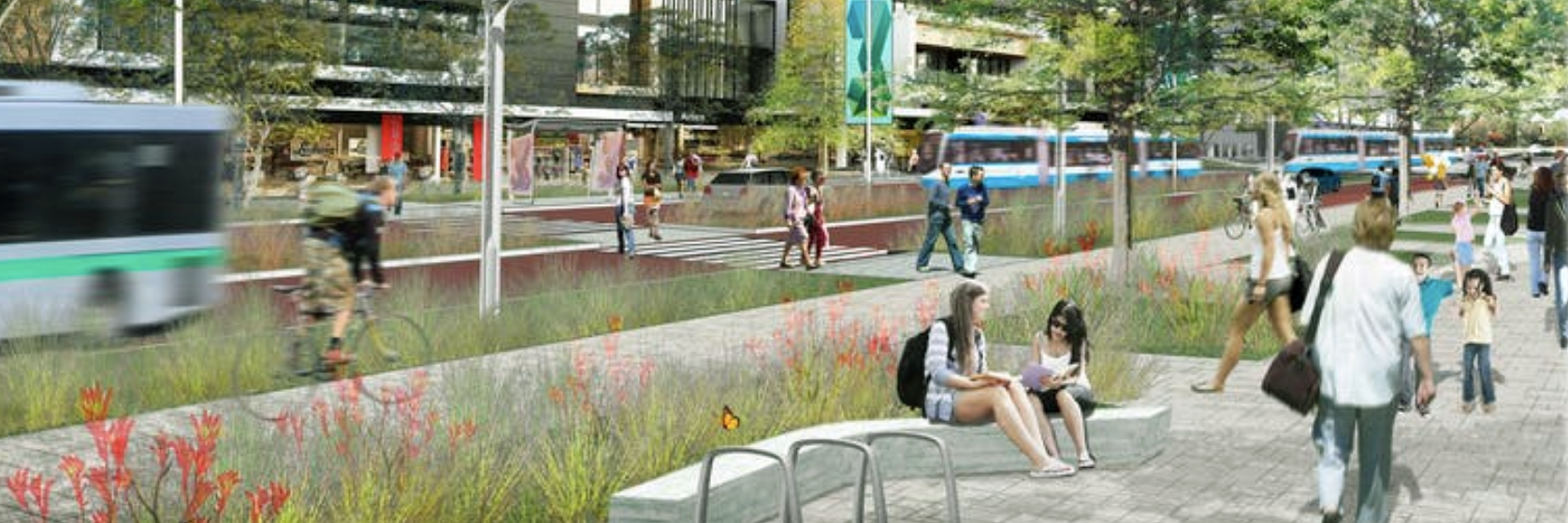Federal Government Cities Inquiry
MSSI, in partnership with Chancellery, led the development of a cross-faculty response to a Federal Parliamentary inquiry in the Australian Government’s Role in the Development of Cities.

University of Melbourne’s Prof Carolyn Whitzman, Dr Julie Wells, Prof Lars Coenen and Prof Stephan Winter provide expert witness to Hon Sharon Bird MP, Mr John Alexander OAM, MP, and Mr Andrew Wallace MP Photo: Alexei Trundle
As a result of this Inquiry, the House of Representatives Standing Committee on Infrastructure, Transport and Cities have recently tabled their Report ‘Building Up & Moving Out: Inquiry into the Australian Government's role in the development of cities’.
The University submitted to this inquiry last year, and was represented at Committee hearings by V-P Policy and Projects Dr Julie Wells, Professor Stephan Winter, Professor Lars Coenen and Professor Carolyn Whitzman. The University’s input is well reflected in the Committee’s report, with our submission and evidence referenced (sometimes lengthily) at more than 20 points. The Committee has particularly drawn on University experts’ advice on freight transport, renting and housing affordability, innovation and global best practice. This is a great outcome that shares knowledge in a practical way.
The Committee Chair's foreword places Australia 'at a turning point' and calls for immediate, bipartisan actions on the development of cities. In keeping with the central theme of integration, in Part 1 of the Report calls for horizontally and vertically linked infrastructure, housing, employment and services across all levels of government. It highlights the Committee’s vision for integrated cities and integrated regions, supported by development consistent with sustainability, connectivity and liveability.
Sustainability is core to Part 2, which covers relationships and well being within the community and between communities across measures focused on housing affordability, sustainability, transport and engagement. Another strong theme is smart capability and technological innovation, which runs through measures aimed at improving transport and freight, enhancing research and analysis underpinning settlement, and reducing environmental negatives.
The Report in Part 3 highlights structural changes that would enable better outcomes in cities development, such as clarifying the governance role of the Federal Government and proposing ways to improve the wide-reaching impact of infrastructure procurement.
Read the University of Melbourne submission
A list of the recommendations provided to the Inquiry by the University of Melbourne can be found below:
RECOMMENDATIONS
The Australian Government has a substantive role in facilitating the strategic development of Australian cities. Its national remit, global connections and convening power can facilitate coordination with, and leveraging of, academic, State/Territory/Local Government, non-government organisations and private sector expertise. This in turn can accelerate the productive export of Australian goods and services, including skills. The Smart Cities Plan correctly notes that the Australian Government has several key levers at its disposal, namely taxation, finance, welfare, superannuation and foreign investment policy.
Cities around the world are anticipating disruption though significant population growth, new sensory technology, accessibility challenges and infrastructure demands along with emerging risks to privacy, safety and social equity. The University’s research suggests that an effective framework for developing and advancing sustainable development solutions is a ‘Living Lab’ approach, which offers collaboratively designed and tested outcomes that transparently engage the general public in urban transition.
Sub-Inquiry – Sustainability Transitions in Existing Cities
Recommendation 1: The Australian Government should support cities to make a rapid system-wide transition to more sustainable and socially just urban forms, providing strategic leadership, partnership and supportive co-investment and/or incentives in areas such as: housing; mass transport links; energy and efficiency; data analytics and smart systems to underpin transport and land planning. This could be achieved through, for example:
- Investment in planning and decision-making tools and soft infrastructure, such as the urban analytics provided by Australian Urban Research Infrastructure Network (AURIN), to build an evidence base and inform cities’ decision-making;
- Support of research that seeks solutions to the challenges of rapidly growing cities, including through existing collaborative vehicles such as CRC-P grants;
- Provision of incentives to align affordable housing construction with other infrastructure development as part of City Deals and Smart Cities;
- Support of emerging new industries such as prefabricated materials and emerging smart technology research and trials;
- Leadership on clean energy policy, energy efficiency and pollution monitoring, and promotion of associated technologies in urban environments and planning processes.
Recommendation 2: Effective and inclusive metropolitan governance frameworks are required to enable the participation of all levels of government in sustainable urban transitions. These must be transparent, evidenced-based, and well-coordinated.
Recommendation 3: Australian Government policy settings should facilitate co-investment in social and affordable housing, mass transportation, and social and health infrastructure.
Recommendation 4: Commonwealth regulations relating to development of cities should be guided by Caring for Country principles, drawing on Indigenous expertise in land management and bringing Indigenous Australian culture, history and identity more inclusively into our cities.
Recommendation 5: The Australian Government should invest in relevant education and research to support best-practice urban development.
Recommendation 6: In accordance with its undertakings Australia should aim to exceed the Goal 11 targets of the Sustainable Development Goals, as well as our commitments through the United Nations New Urban Agenda, relating to making cities inclusive, safe, resilient and sustainable.

Sub-Inquiry – Growing New and Transitioning Existing Sustainable Regional Cities and Towns
Recommendation 7: The Australian Government should continue to facilitate and support global city-to- city networks, to enable knowledge exchange, productivity growth and peer-driven development of regional Australian towns.
Recommendation 8: The Australian Government should engage the private sector and support policies and programs to enable greater data availability, access to information, smart technology/planning tools, and collaboration between recognised innovation hubs and regional cities and towns.
Recommendation 9: In promoting regional excellence and competitiveness, the Australian Government’s policy response should emphasise Smart Specialisation approaches of building up existing capabilities, resources and assets with participatory governance.
Recommendation 10: The Australian Government should facilitate co-investment with other governments/stakeholders in public mass transport links between regional centres, and between regional centres and metropolitan centres, to advance regional development.
Recommendation 11: The Australian Government should consider the role of new technologies, including those that underpin evolving modes of mobility, and essential infrastructure as threshold investments for establishing new settlements.